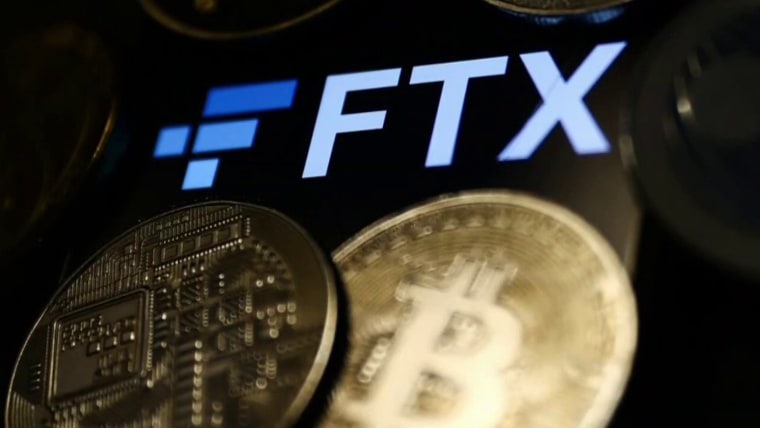The downfall of the cryptocurrency exchange FTX has deepened concerns about the lack of safeguards in crypto for big investors and everyday consumers alike — and escalated questions about what role the government should have in an industry known for its defiantly anti-establishment attitude.
The Bahamas-based company on Friday started the process of filing for Chapter 11 bankruptcy protections. The 30-year-old chief executive Sam Bankman-Fried, who rapidly rose to fame as a billionaire entrepreneur and philanthropist, resigned. Reuters and CNBC reported that two unnamed sources said $1 billion in customer assets may be missing; NBC News has not confirmed that report.
It’s a collapse that highlights how U.S. regulators have been slow to take action in a space where there are few concrete answers about how much power they have. Earlier this year, Securities and Exchange Commissioner Hester Peirce told CNBC at a blockchain conference that the U.S. had “dropped the regulatory ball.”
Peirce recently said FTX could be a “catalyst” for the government to clarify crypto regulation and that the SEC would be an effective regulator “if we got our act together,” according to CoinDesk.
The regulation gap for FTX is twofold: Crypto is an almost entirely unregulated industry, and any oversight U.S. regulators would have had was nullified by FTX being headquartered in the Bahamas.
For now, crypto comes with a warning: buyer beware. Josephine Wolff, an associate professor of cybersecurity policy at Tufts University who has studied crypto, said the U.S. regulatory architecture is not set up to provide guarantees for investments on crypto exchanges, whereas traditional institutions like banks can usually offer some form of insurance in rocky times.
“If you have a bank account that’s FDIC-insured, that’s saying, ‘No matter what happens, this money is guaranteed by the government.’ But you lose those guarantees with crypto,” Wolff said. “We say, ‘You can buy this but it’s essentially investing in a very uncertain thing that may lose all of its value, and if it does, you don’t have any protection there.’”
FTX became one of the most recognizable crypto brands in the U.S. thanks in part to high-profile marketing deals. But because the company is based in the Bahamas, Bankman-Fried didn’t have to open its books to U.S. regulators.
Outside of questions about crypto, U.S. government watchdogs could have played a role — if the company had been based in the U.S.
Eswar Prasad, an economics professor at Cornell University, said FTX’s Bahamas residency put it outside financial reporting requirements that U.S. companies must meet.
Generally speaking, even crypto firms based in the U.S. are subject to relatively little federal oversight and few regulatory rules, according to people who follow the crypto industry.
“The U.S. regulatory system is not well-designed to handle crypto,” said Aaron Klein, a senior fellow in economic studies at the Brookings Institution, a Washington think tank. “But part of the appeal of crypto was that it’s not well-regulated and that it disrupts the existing financial system.”
Bankman-Fried has not directly addressed accusations of fraud, but he has apologized for what happened with FTX and said he made a series of mistakes including “poor internal labeling of bank-related accounts.”
No specific federal laws govern the crypto business — a fact usually celebrated by crypto’s most enthusiastic backers, many of whom long for a bank-free, libertarian-style financial system where fortune, in the words of former Crypto.com commercial spokesman and actor Matt Damon, favors the brave.
Crypto has grown exponentially in recent years, pumped full of investment capital that has rocketed bitcoin and other currencies from a seemingly fringe hobby for “tech bros” into a ubiquitous cultural force. In the last two years, crypto giants like FTX spent millions trying to attract retail investors with Super Bowl commercials and other flashy advertising campaigns.
That has coincided with a discussion of how the U.S. government should regulate crypto, if at all.
Securities are regulated by the U.S. government with laws that are applied to just about every sort of financial instrument, including stocks, bonds, mutual funds and more. The SEC oversees this regulation, and the Commodity Futures Trading Commission oversees financial tools like futures and options.
Crypto exchanges are supposed to work similarly to a stock-trading platform: Customers can buy various crypto tokens with money or other cryptocurrencies. The prices of those assets can go up and down, and in the crypto world, often do with more volatility than traditional investments.
The exchanges usually charge fees to facilitate the buying and selling of these assets, but otherwise hang on to the money and assets traded. Coinbase, a major U.S. crypto exchange, has made clear this is how it operates.
The question that has loomed over the industry is whether tokens and cryptocurrencies should be considered securities — and regulated as such. It’s also an open question whether courts would agree that cryptocurrencies and tokens are securities. In July, a federal court ordered a new trial to confront the question.
Congress has taken some action. In June, Sens. Cynthia Lummis, R-Wyo., and Kirsten Gillibrand, D-N.Y., introduced a bill meant to establish a clear regulatory scheme for the crypto industry. Meanwhile, the crypto industry has an increasingly sizable lobbying presence in Washington.
The fall of FTX has renewed and intensified calls for more regulation, which have in turn sparked responses from many in the crypto world who have sought to make clear distinctions between their businesses and the one run by Bankman-Fried.
When the progressive Sen. Elizabeth Warren, D-Mass., tweeted last week that the implosion of FTX showed why the crypto industry needed SEC oversight, Brian Armstrong, CEO of popular crypto trading platform Coinbase, responded that it was the SEC that had created the environment in which FTX could happen.
“FTX.com was an offshore exchange not regulated by the SEC,” Armstrong wrote. “The problem is that the SEC failed to create regulatory clarity here in the US, so many American investors (and 95% of trading activity) went offshore.”
“Punishing US companies for this makes no sense,” he added.
Brad Garlinghouse, CEO of the financial technology company Ripple, backed Armstrong’s sentiment.
“Brian is right –to protect consumers, we need regulatory guidance for companies that ensures trust and transparency. There’s a reason why most crypto trading is offshore — companies have 0 guidance on how to comply here in the US,” he wrote.
In response to an emailed request for comment, an SEC spokesperson pointed NBC News to a speech from SEC Chair Gary Gensler, who said in September that the regulator had been clear that it does consider crypto tokens to be securities.
“Not liking the message isn’t the same thing as not receiving it,” Gensler said.
Gensler has also said he views crypto exchanges that don’t work with the SEC as “operating outside of the law,” according to Forbes.
U.S. government regulation is not a complete bulwark against people who decide to commit fraud, said Klein, the fellow at the Brookings Institution. He pointed to examples of other high-profile firms and business titans wrecked by wrongdoing.
“MF Global was a regulated broker that took customers’ funds and made investments on them. Enron and MCI WorldCom issued corporate debt in regulated industries but engaged in massive accounting fraud. Bernie Madoff ran a giant Ponzi scheme right under the nose of the Securities and Exchange Commission,” Klein said.
“The assumption is if there was more regulation, they couldn’t have done this,” he added. “But I really question that assumption.”
Source: | This article originally belongs to Nbcnews.com











